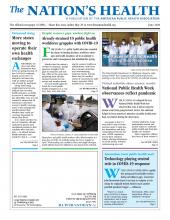Long-term exposure to air pollution could be contributing to disparate rates of COVID-19 deaths, a new study finds.
Researchers at the Harvard T.H. Chan School of Public Health released the nationwide study in April, finding that COVID-19 patients who lived in places with historically high levels of fine particulate matter pollution, more commonly known as PM 2.5, were more likely to succumb to the virus than patients who lived in communities with cleaner air.
Just a slight increase in air pollution was associated with a 15% increase in the COVID-19 death rate, even after adjusting for factors such as smoking, poverty and number of available hospital beds.
“What we found speaks to the possibility that we should be prioritizing counties that have higher levels of air pollution because they may be more vulnerable to (COVID-19) deaths,” said study co-author and APHA member Francesca Dominici, PhD, a professor of biostatistics, population and data science at the Harvard public health school.
The data suggests, for example, that if Manhattan had lowered its average particulate matter exposure by just one microgram per cubic meter in the last two decades, it may have prevented 248 COVID-19 deaths as of early April. The study — the first of its kind — is based on historical air quality data from about 3,000 U.S. counties, as well as COVID-19 deaths through April 4.
Given years of research showing links between particulate matter exposure and heart and respiratory problems — both conditions that increase COVID-19 complications — it was not surprising to find a link between air pollution and coronavirus deaths, said Dominici, who also serves as co-director of the Harvard Data Science Initiative. But the magnitude of the effect — that a small increase in long-term particulate exposure leads to a big increase in COVID-19 deaths — was still troubling, she said.
“The effect was large and alarming, and we’ll want to continue to conduct additional analysis,” she told The Nation’s Health. “But we wanted to publish the results as soon as possible and make the data available to help counties protect those at risk.”
While the study did not break down its results by subpopulations, Dominici said its overall findings could help explain racial disparities involving COVID-19. Recent data from the Centers for Disease Control and Prevention found that black residents are disproportionately hospitalized with the disease. Meanwhile, other research shows that black communities typically experience higher levels of air pollution and face greater risk of premature death due to particle pollution than white communities.
“This is one reason we hope better (COVID-19) data by race will be made available to researchers,” she said.
A growing number of states have been releasing data on COVID-19 cases, deaths and testing by race and ethnicity. The information has helped public health workers determine how to target their outreach and messaging on the disease. As of April 22, 38 states were sharing data broken down by race and ethnicity for COVID-19 cases, 31 states were sharing the data on deaths, and Kansas and Illinois were sharing it on testing, according to Johns Hopkins University.
Dominici said the findings also show the value of evidence-based air quality standards and the serious risk of regulatory rollbacks now happening at the federal level. In the early weeks of the U.S. outbreak, the U.S. Environmental Protection Agency announced a number of harmful policy changes, including halting regulatory enforcement during the pandemic and finalizing new rules undermining mercury emission limits and fuel economy standards. Air pollution is already associated with hundreds of thousands of premature deaths in the U.S. each year.
“As a scientist, I try to stay away from commenting on politics,” Dominici said. “But what’s happening right now is so irresponsible...How can you relax regulations and allow industry to pollute the air at a time when a pandemic virus is killing us through our lungs?”
The air pollution study, under review for publication in the New England Journal of Medicine as of late April, is available at https://projects.iq.harvard.edu/covid-pm.
For the Johns Hopkins information on racial data transparency, visit https://coronavirus.jhu.edu/data/racial-data-transparency.
- Copyright The Nation’s Health, American Public Health Association









